At 2.45pm on Monday 9 October, the EU's Hungarian Commissioner Olivér Várhelyi announced that all EU payments to the Palestinians would be "immediately suspended".
"The scale of terror and brutality against Israel and its people is a turning point. There can be no business as usual," the Commissioner said on X, formerly Twitter.
The message caused immediate consternation in EU capitals, not least in Dublin.
Worse, it set off a highly damaging chain of confusion over the EU’s response to the Hamas terror attacks and Israel’s bombing campaign in Gaza, culminating in the controversy over Commission President Ursula von der Leyen’s visit to Israel days later, which President Michael D Higgins described as "reckless" and which Taoiseach Leo Varadkar said "lacked balance".
The scale of terror and brutality against #Israel and its people is a turning point.
— Oliver Varhelyi (@OliverVarhelyi) October 9, 2023
There can be no business as usual.
As the biggest donor of the Palestinians, the European Commission is putting its full development portfolio under review, worth a total of EUR 691m
⤵️
The harsh exchanges in the Dáil indicate that this will become a hot issue in the run up to the next election.
"This is a very sensitive domestic political issue and it will be a wedge for Sinn Féin," said one senior source.
Europe's very different attitudes to conflict
However, the whole affair reveals much about how the EU often struggles to reconcile 27 very different attitudes to the Israeli-Palestinian conflict.
That is for historical and social regions.
Germany and Austria have long shown steadfast support to Israel, and that is also true for central and eastern European countries which joined in 2004, especially Hungary and Czechia, and more recently Poland.
For other countries, especially those with large Arabic or Muslim populations, or those with left-leaning governments, there is greater sympathy for the Palestinian cause.
At play too was some institutional tussling. Member states jealously guard their role as being in charge of foreign policy.
"We find it very, very hard as an EU to formulate and to articulate a clear, coherent policy which represents 27 member states," said one source familiar with the process.
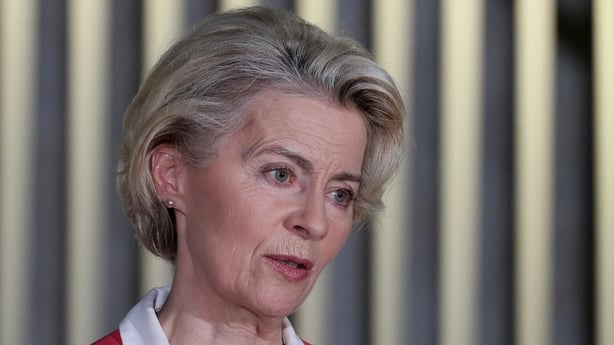
It was at 4.40pm, on Saturday 7 October, while Hamas was still killing hundreds of Israeli civilians, that the first EU response landed.
President von der Leyen, due to address a political gathering in Bordeaux, issued the "strongest possible" condemnation as reports filtered through.
"Israel is entitled to defend itself. The European Union stands with Israel in this ordeal," she said.
However, capitals had already been drafting a response.
For the EU to get an agreed position on any global crisis is often a line-by-line, word-by-word slog, no more so than when it comes to the Middle East.
The starting point, believe it or not, is a nine-paragraph statement by EU leaders from a summit in 2013, supporting a two-state solution, promising to fund an emerging Palestinian state, deploring the expansion of Israeli settlements in the West Bank, but supporting Israel's legitimate aspirations.
EU statement's language splits member states
At 5.12pm, Josep Borrell, the EU’s chief diplomat whose job is to coordinate the response, issued the statement on behalf of the 27 member states.
The EU condemned "in the strongest possible terms" the indiscriminate attacks by Hamas. Israel had the right to defend itself "in line with international law".
The next day, Israel’s iNews24, quoting diplomatic sources, reported that Mr Borrell’s statement had been watered down.
"The EU wanted to issue a harsher statement but Luxembourg, Ireland and Denmark refused to call Hamas a terror organization," said a tweet, viewed 1.7 million times.
This prompted a sharp response from Dublin.
"[The Department of Foreign Affairs] confirms it is categorically false that Ireland refused to agree a reference to Hamas as a terrorist organisation in the EU statement in response to attacks in Israel.
"Hamas is listed by the EU as a terrorist organisation, unanimously agreed by all [member states]."
However, Ireland had wanted stronger language, urging that regional escalation be avoided. In the end the text did not reflect that call.
As the death toll mounted and Israel’s response got underway, the EU scrambled to influence developments.
On Sunday, Charles Michel, the European Council president, phoned both the Palestinian prime minister Mohammad Shtayyeh and King Abdullah of Jordan.
Mr Michel, who represents the 27 EU leaders, said the EU condemned Hamas’ "terrorist violence" and spoke of the urgent need for de-escalation.
He also called for "the full respect of international humanitarian law," but said that Israel had the "right to self-defence".
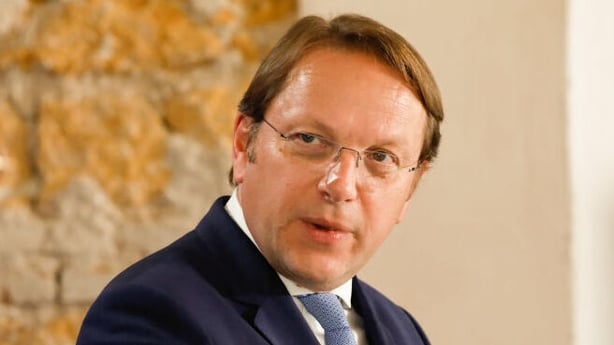
By Monday morning the EU’s messaging seemed clear: a harsh condemnation of Hamas, calls for de-escalation and Israel having the right to defend itself but in line with international humanitarian law.
But when Mr Várhelyi announced that afternoon that the EU, by far the biggest donor to the Palestinians, was suspending aid, all hell broke loose.
Irish officials in Brussels began calling the European Commission for answers.
Other member states, including Spain, Belgium and Luxembourg were alarmed.
It was at odds with the EU’s carefully crafted response and was coming on the eve of a hastily arranged videoconference of EU foreign ministers.
One EU diplomat called Mr Várhelyi’s intervention a "grave misstep".
Journalists on the Commission’s WhatsApp press group were furiously looking for answers.
At 3.36pm, the Commission’s chief spokesperson Eric Mamer texted that he could "confirm the substance of the tweets".
Half-an-hour later, he said a statement was being prepared.
At 6pm, Ireland was the first to break cover.
"Our understanding is that there is no legal basis for a unilateral decision of this kind by an individual Commissioner and we do not support a suspension of aid," said a spokesperson for the Department of Foreign Affairs.
"We are formally requesting the Commission to clarify the legal basis for this announcement," they added.
Ten minutes later, the EU commissioner for humanitarian aid Janez Lenarčič weighed in, flatly contradicting his Hungarian counterpart.
"EU humanitarian aid to Palestinians in need will continue as long as needed," he tweeted.
While I most strongly condemn the terrorist atack by #Hamas, it is imperative to protect civilians and respect IHL.
— Janez Lenarčič (@JanezLenarcic) October 9, 2023
EU humanitarian aid to #Palestinians in need will continue as long as needed.
Irish officials continued to contact the Commission into Monday evening, but there was still no clarity.
Then at 8.15pm the Commission statement was published. However, it raised more questions than answers.
The Commission was launching "an urgent review" to make sure no EU funding "indirectly enables any terrorist organization to carry out attacks against Israel".
Yet, earlier that day the Commission had made it clear no funding went to Hamas in any shape or form, and that there were strict vetting rules.
"It’s very clear that the EU does not fund Hamas or any other terrorist organization activities, either directly or indirectly," development aid spokesperson Ana Pisonero had told reporters at midday.
EU funding, she said, kept essential services going, financed the Palestinian Authority, supported the health sector, provided social assistance for vulnerable families and salaries for civil servants.
Then at 9pm, Mr Borrell, who was said by one diplomat to be "extremely angry" at the Várhelyi statement, tweeted that the review of EU aid just announced "will not suspend the due payments" as this would "punish all Palestinians, damage the EU’s interests and further embolden terrorists".
The suspension of the payments - punishing all the Palestinian people - would have damaged the EU interests in the region and would have only further emboldened terrorists.
— Josep Borrell Fontelles (@JosepBorrellF) October 9, 2023
By this stage Dublin was reassured that the Várhelyi statement had effectively been reversed.
The Commission hastily said there was a difference between humanitarian aid - which would continue to flow regardless - and development aid, which would be subject to a review.
Yet, the fallout continued.
Mr Várhelyi was essentially being charged with disregarding both the process and substance of how the EU comports its Middle East policy.
That was why, just as the Commission appeared to have extinguished the fire around the Várhelyi tweets, President von der Leyen's trip drew so much heat.
By chance, the heads of the Commission’s 27 cabinets were gathering for their weekly meeting when the Hungarian’s tweets landed that Monday afternoon.
One official present said it was clear that Mr Várhelyi had been on a solo run and that his statement had not been endorsed by President von der Leyen.
Mr Várhelyi’s own officials protested that he was entitled to express his opinion (he is the EU’s neighbourhood and enlargement commissioner), but they were told that his intervention should have been coordinated, and that it lacked "collegiality", the sacred glue which is supposed to bind the 27 EU commissioners.
Mr Várhelyi was essentially being charged with disregarding both the process and substance of how the EU comports its Middle East policy.
That was why, just as the Commission appeared to have extinguished the fire around the Várhelyi tweets, President von der Leyen’s trip drew so much heat.
By chance, both Ms von der Leyen and the European Parliament President Roberta Metsola had been planning a short visit.
Ms Metsola had met Haim Regev, the Israeli ambassador to the EU, on the Wednesday, four days after the Hamas atrocities.
He had passed on to her an invitation from the speaker of the Knesset.
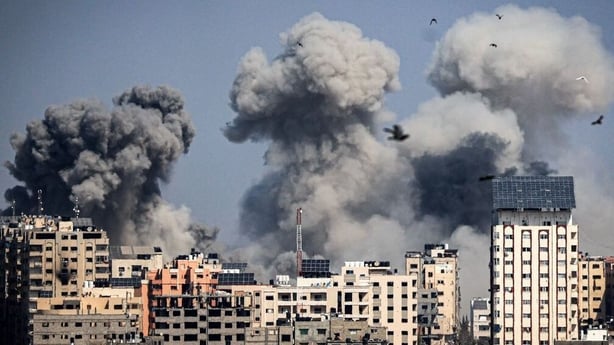
Björn Seibert, Ms Von der Leyen’s chief of staff, had also been in touch with the Israelis.
However, Ms Metsola had to run the idea past the European Parliament.
On Thursday morning, 12 October, she met the leaders of the political groups in the Parliament to canvas their views.
She told them the trip would be to express solidarity with Israel, call for the release of hostages, encourage a humanitarian response and provide aid corridors for the people of Gaza.
The group leaders unanimously supported her trip.
However, according to an official, there was a conscious decision that Ms Metsola should not meet the Israeli prime minister Benjamin Netanyahu.
"This was a very sensitive issue for the European Parliament," said the official.
Read more:
White House asks Congress for $106bn for Ukraine, Israel
Humanitarian 'catastrophe' facing Gaza's 50,000 pregnant women
Israeli troops told they will soon see Gaza 'from inside'
At 10.25pm on Thursday, the European Commission announced that Ms Von der Leyen and Ms Metsola would visit Israel "to express solidarity with the victims of the Hamas terrorist attacks, and meet with Israeli leadership".
Neither was able to secure a commercial flight to Israel, so both women left Brussels together at 5am for Tel Aviv on a chartered jet.
By this stage, Israel’s retaliation against Hamas was raging.
Thousands of airstrikes had hit Gaza, killing hundreds and razing whole neighbourhoods .
International concern now focused on the plight of the people of Gaza, the lens having shifted from the appalling terror attacks of the previous Saturday.
Israel was effectively imposing a siege on Gaza.
At 2am on Friday morning, the UN Secretary General Antonio Guterres tweeted: "Crucial life-saving supplies – including fuel, food and water -- must be allowed into Gaza. We need rapid and unimpeded humanitarian access now."
Crucial life-saving supplies – including fuel, food and water -- must be allowed into Gaza.
— António Guterres (@antonioguterres) October 11, 2023
We need rapid and unimpeded humanitarian access now.
The next morning, Charles Michel, the president of the European Council, responded: "Universal values and human dignity. Always and everywhere. This is the core of the EU.
"International law and international humanitarian law must be respected. Basic supplies must reach the most vulnerable."
Meanwhile, on arrival in Israel, Ms Von der Leyen and Ms Metsola were taken by the Knesset speaker Amir Ohana to the Kfar Aza kibbutz, where more than100 civilians had been massacred by Hamas the previous Saturday.
At noon, Ms Metsola tweeted: "We are here with a message of solidarity after the worst terror attack #Israel has endured in generations. Terror will not prevail. How we respond matters.
"We can - we must - stop Hamas. And do what we can to mitigate humanitarian consequences."
Back in Israel.
— Roberta Metsola (@EP_President) October 13, 2023
We are here with a message of solidarity after the worst terror attack #Israel has endured in generations.
Terror will not prevail. How we respond matters.
We can - we must - stop Hamas. And do what we can to mitigate humanitarian consequences.@vonderleyen pic.twitter.com/VxMgnwi0eU
Ms Von der Leyen then went to meet Mr Netanyahu while Ms Metsola visited the scene of the music festival massacre, where Irish-Israeli woman Kim Danti had been shot.
After meeting Mr Netanyahu - without Ms Metsola - Ms Von der Leyen delivered a harrowing portrait of what she had witnessed at Kfar Azza.
She said: "What I saw and what I heard is breaking my heart.
"The blood of people killed in their sleep. The stories of innocents burned alive or slaughtered in their homes.
"The parents hiding their newborn babies before confronting the terrorists. Children and elderly people ripped from their families and taken hostage, even Holocaust survivors.
"Over 1,300 human beings were murdered by barbaric terrorists of Hamas fighting against Israel."
While few would deny the horrors she had witnessed at the Kibbutz, Ms Von der Leyen did not publicly and unequivocally call on Israel to respond within the constraints of international law.
However, with Mr Netanyahu standing next to her, Ms Von der Leyen said there was "only one possible response".
That was that "Europe stands with Israel." Israel had the right, indeed the duty, to defend its people.
She said Hamas alone was responsible, and their actions had nothing to do with the "legitimate aspirations" of the Palestinian people and was only bringing more suffering upon them.
She added: "I know that how Israel responds will show that it is a democracy."
It was this statement which raised eyebrows further. While few would deny the horrors she had witnessed at the Kibbutz, Ms Von der Leyen did not publicly and unequivocally call on Israel to respond within the constraints of international law.
"Madame Von Der Leyen…you forget an important message: Israel must respect international humanitarian law," tweeted President Emmanuel Macron’s former Europe Minister Nathalie Loiseau, now an MEP, on Saturday afternoon.
"I do not understand what the President of the Commission has to do with the foreign policy of the EU, for which she is not responsible," she added.
EU capitals were also becoming alarmed at Ms Von der Leyen appearing to stray beyond the carefully delineated policy lines, on top of the confusion around Mr Várhelyi’s remarks about Palestinian aid.
"It got so messy about something so sensitive and divisive within societies in EU member states," says one EU diplomat, "that by the weekend EU leaders informally came together with the notion of issuing a joint statement, to calm the waters, to bring things back into a workable, balanced framework, that, while it acknowledges Israel's right to defend itself against Hamas and acknowledges the horrors of that attack, it frames that within the context of international humanitarian law."
EU reaches 'common position'
Mr Michel’s team had already been in touch with capitals on Saturday, in particular those countries taking a hard line on Israel’s right to defend itself.
An initial draft of the statement was circulated on Saturday night and negotiations between capitals continued into Sunday.
The Irish Government joined other "like-minded" countries in pushing to ensure the statement highlighted the need for Israel to respond according to international law.
It was not a straightforward process, according to one source, not least because the phrase "international humanitarian law" has strict legal connotations that relate to the Geneva Conventions.
Just before 5pm, the leaders’ statement appeared.
It spelled out, in ways that are not normally necessary, that this was the EU’s "common position".
Israel’s right to defend itself had to be "in line with humanitarian and international law. We reiterate the importance [of ensuring] the protection of all civilians at all times in line with International Humanitarian Law," it said.
Four hours later, Ms von der Leyen issued another tweet.
There was a slight shift towards the capitals’ position, but it remained nuanced, with no implied criticism of Israel’s response.
"There is no justification for Hamas’ heinous act of terror," she wrote.
"Israel has the right to defend itself. At the same time civilians in Gaza are also victims of Hamas. This is why we are tripling our humanitarian aid for Palestinians in need."
There is no justification for Hamas' heinous act of terror.
— Ursula von der Leyen (@vonderleyen) October 15, 2023
Israel has the right to defend itself.
At the same time civilians in Gaza are also victims of Hamas.
This is why we are tripling our humanitarian aid for Palestinians in need. pic.twitter.com/x0zlUOKdb8
The next day in Brussels, Ms Von der Leyen’s spokesperson Eric Mamer, on the defensive in the Commission press room, was asked if she had gone beyond her mandate.
Mr Mamer replied: "I don't remember anybody having criticized the President for going to Ukraine after the outbreak of the war in March [2022] when she went to Bucha and she saw the body bags that were there after the Russian attack."
Diplomats point out that on Ukraine, the EU was unambiguously and unanimously, with the exception of Hungary, in support of Ukraine in the face of Russia’s full-scale invasion.
The Middle East was different. EU leaders were extremely sensitive to the restive pro-Palestinian communities within their societies and the need to stick to carefully elaborated policy lines.
"That is something that Von der Leyen had a blind spot for," said one diplomat. "That was a key concern."
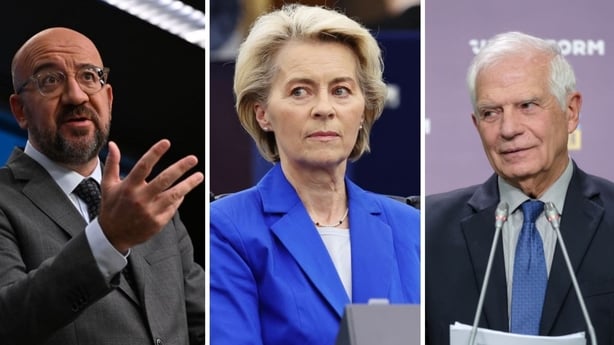
However, sources close to Ms Von der Leyen point out that she had travelled into the country at some risk in contrast to the megaphone diplomacy of critics.
In private, they say, with both Mr Netanyahu and the speaker of the Knesset at the kibbutz where there was still blood on the walls, she had urged Israel to take account of the Palestinian people, that they should be distinguished from Hamas, that there was a need for humanitarian support and to get EU citizens out of Gaza.
One source said the death toll in Israel in a single day, 1,400, would have been the equivalent of 65,000 Europeans.
"People forget this," said the source. "They don't seem to understand the impact that this has on Israeli society.
"It's like when President von der Leyen went to Bucha. Our policy is that we stand by our friends and allies and partners when they are subjected to terrible attacks. And she's not going to apologize for that.
"You first need to show your compassion to the country that has been the subject of this terrible attack before you can then engage with them in public on what needs to be done," they added.
EU's triumvirate leadership system
The source emphasised that at the video conference of EU leaders on Tuesday, the leaders of Italy, Austria, the Netherlands, Estonia, Denmark and Croatia all spoke in favour of Ms Von der Leyen’s trip to Israel and that no leader criticised her.
However, an Irish Government source observed that since Ms von der Leyen was on the call, direct criticism from leaders would be unlikely.
The Taoiseach was one of a number who emphasised the need for "balance" in every response the EU made.
As to speculation that the Commission president was showing her German side in what seemed to be unequivocal support for Israel, one source said: "Obviously she's German, and like all Commissioners she has a background.
"But she's also President of the European Commission and she's representing the whole of the EU - she’s not the only one - but when she goes there, she doesn't go there as a German politician, she goes there as President of the European Commission."
Indeed, part of the problem is that Europe currently has three prominent personalities – Ms Von der Leyen, Council President Mr Michel and High Representative Mr Borrell - all from different member states and political families and each keen to project Europe’s role in person.
Yet, each is supposed to operate within the confines of what 27 capitals have agreed.
The system which has created this triumvirate evolved through the Maastricht and later Lisbon Treaties.
These, as one diplomat ruefully points out, were negotiated at a time when the EU was not dealing with one geopolitical crisis after another and not having leaders’ summits virtually every month.
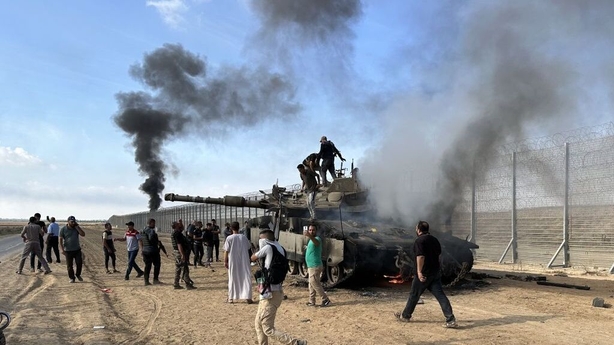
These days too, as a grassroots issue, the Middle East is bleeding more acutely into domestic politics.
EU Matrix, a data analysis think tank, has published a report on voting patterns over the past four years at national and European level which shows significant differences between member states, with Israel gaining more support in central and eastern Europe.
"On the other hand, countries such as Ireland, because of their own history, and west-European governments led by left-leaning majorities (such as Luxembourg) tend to be more supportive of the Palestinian movement and promptly rejected the proposals to cut EU funding," said the report.
Ireland has remained firmly within the Palestinian-sympathetic camp and has argued at EU level over the years that the occupying power has legal responsibilities.
One diplomat has said this camp, loosely including Luxembourg, Belgium, Spain, Slovenia, France, Denmark and others, has decreased in size due to the enlargement of the EU, the polarisation and radicalisation of domestic politics, and Israel’s effective lobbying in Brussels.
Ireland is also a member of the West Bank Protection Consortium, which includes ten EU member states, Norway, Canada, the UK as well as the EU’s Humanitarian Aid body ECHO and five other NGOs.
It was set up in 2015 to fund vulnerable Palestinian communities in the West Bank, where hundreds of families had been, or were facing, forcible expulsion by the Israeli authorities and settlers, and to tackle Israel over the demolition of schools and buildings funded by the EU.
In May, the EU office in the West Bank issued a joint demand, along with the diplomatic missions of nine countries, including Ireland, that Israel halt "all confiscations and demolitions in the occupied West Bank, to return or compensate for donor funded humanitarian items and to give unimpeded humanitarian access."
For now, the EU, by choice and circumstance, accepts that the US and the Arab world, in particular Saudi Arabia, Egypt and Jordan, still take the lead on the shattered Middle East peace process.
The statement said Israel had demolished or confiscated property that had been funded by the EU to the tune of €1.2 billion.
It is understood that Ireland discussed possible legal action against Israel for these demolitions with the EU’s humanitarian aid Commissioner Janez Lenarčič.
So far, however, the joint response at the level of 27 member states has been to stick to issuing condemnations on the issue.
Diplomats say the differences which have flared up over the past ten days should not be overstated.
"If you zoom in," said one diplomat, "yes, of course they are there, but with a bit of distance they’re all nuances within the same framework. Everyone ultimately agrees on international humanitarian law, everybody does believe, for better or for worse, that a two-state solution must be found."
For now, the EU, by choice and circumstance, accepts that the US and the Arab world, in particular Saudi Arabia, Egypt and Jordan, still take the lead on the shattered Middle East peace process.
On some horizon, if the process ever bears fruit, the EU will be ready to fund it.
That moment, however, seems further away than ever.







